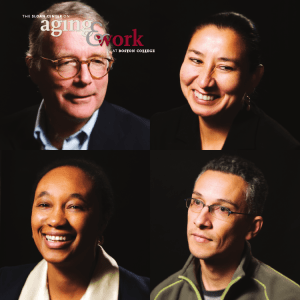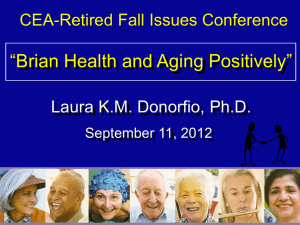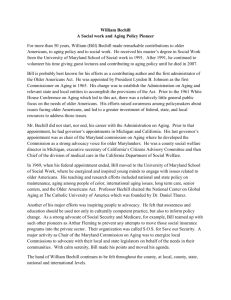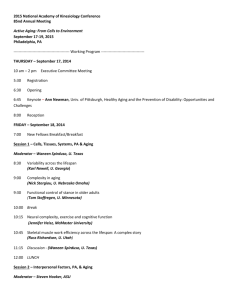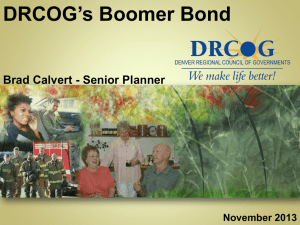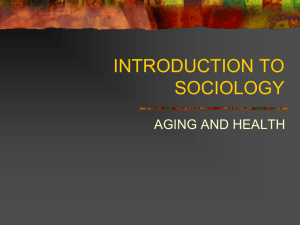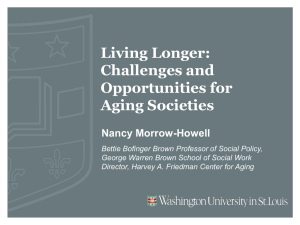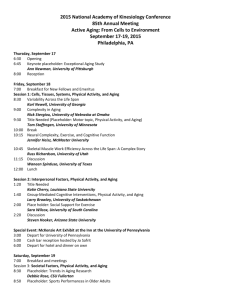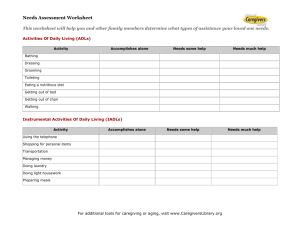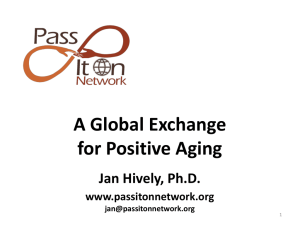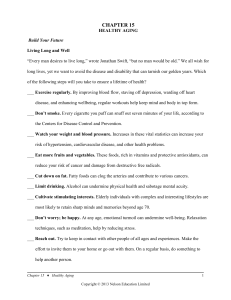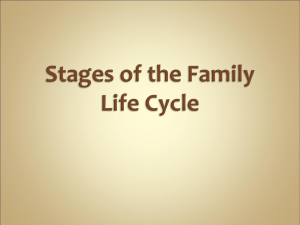Creating Positive Experiences as We Age: Meaning Through
advertisement
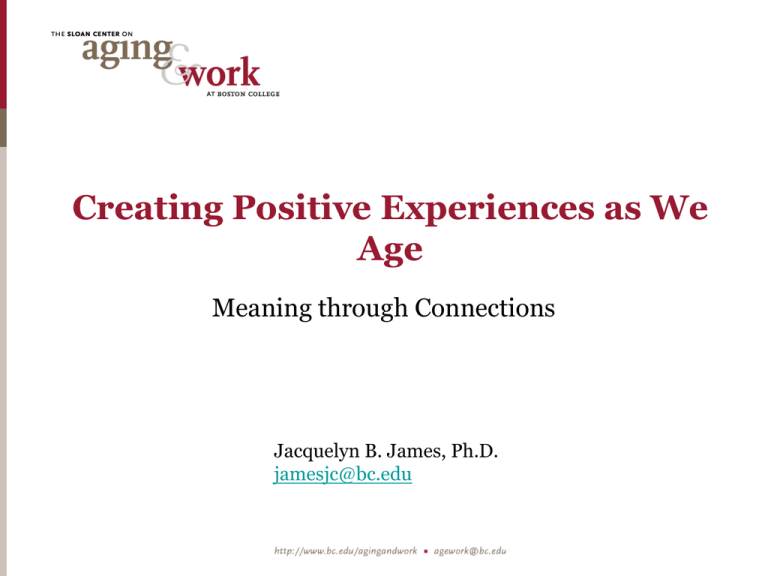
Creating Positive Experiences as We Age Meaning through Connections Jacquelyn B. James, Ph.D. jamesjc@bc.edu A 21st Century Focus on Aging • The U.S. is aging--people are living longer than ever before. • Older adults are healthier than ever before. • The economy has affected plans of the “retirementeligible.” Celebrating Transitions How old are you….really? Your chronological age 20 30 40 50 60 70 80 90 How old you feel when you try a new physical activity vital and energetic frail and ‘spent’ How old you feel when you are with people 20 years older than you young old How old you feel when you compare the types of life experiences you have had with those you thought you would have at this age way ahead of schedule on time way behind schedule How old are you….really? Your chronological age 20 30 40 50 60 70 80 90 How old you feel when you try a new physical activity vital and energetic frail and ‘spent’ How old you feel when you are with people 20 years older than you young old How old you feel when you compare the types of life experiences you have had with those you thought you would have at this age way ahead of schedule on time way behind schedule How old are you….really? Your chronological age 20 30 40 50 60 70 80 90 How old you feel when you try a new physical activity vital and energetic frail and ‘spent’ How old you feel when you are with people 20 years older than you young old How old you feel when you compare the types of life experiences you have had with those you though would have at this age way ahead of schedule on time way behind schedule Expectations for Aging: Quiz 1. Most older adults have difficulty adapting to change. In other words, they tend to be set in their ways. 2. Declines in all five senses normally occur in old age. 3. The majority of older adults say that they are happy most of the time. 4. The vast majority of older adults will at some point end up in a nursing home. 5. Older adults who slowly disengage from work, social connections, community activities are adapting to the inevitable need to withdraw from the world. Women and the Prism of Age • Accumulation of competencies and skills • Health and physical functioning • Expectations for accomplishments and experiences at particular ages • How old you feel compared to people around you • Developmental stages of understanding life experiences and making meaning of them • Roles and responsibilities Subjective Age associated with life events, [You are as old as you feel.] such having children • Cultural perspective shared by groups born in a particular generation • How old do you think others think you are • Connections to organizations and institutions Chronological Age Age and Generations Entering New Territory “All of us are now in uncharted territory, a stage of life not seen before in human history. And whether woman or man, whether working-class or professional, we are all wondering how we’ll live, what we’ll do, who we’ll be for the next twenty or thirty years.” Lillian Rubin, Sixty on Up: The Truth about Aging in America, p. 54 Normative Disengagement? The Journey Continues 生きがい Good News: Life Satisfaction by Age Group Source: Sloan Center on Aging & Work , 2010. Life and Times in an Aging Society Gendered Lives Affects Choice about Involvement • Women still earn less than men and have higher rates of poverty. Because women live longer, the number of poor older women in 2008 (2.4 million) was more than twice the number of poor older men (1.1 million) (Purcell, 2009). • Caregivers of the elderly are predominantly women (66%). (National Alliance for Caregiving, 2009). Women between 50 and 64 are the group most likely to be caring for sick and disabled family members (Ho, Sara, and Michelle, 2005). • When asked about the future, women are somewhat more likely to say that they expect to do volunteer work (83%) than men (77%). Involvement by Age Group 63% involved in Paid Employment 34% involved in Caregiving 32% involved in Volunteering Activities 40% involved in Educational Activities Source: Sloan Center on Aging & Work , 2010. Life and Times in an Aging Society. Engagement by Activity Source: Sloan Center on Aging & Work , 2010. Life and Times in an Aging Society Engagement by Age Groups Source: Sloan Center on Aging & Work , 2010. Life and Times in an Aging Society If you are involved, there are rewards of for greater engagement. • High engagement predicts greater outcomes of well-being compared to no involvement. • Low engagement predicts lower outcomes of well-being compared to no involvement. A Bright Future across the Life Course [Today’s older generation]… could play the lead role in demonstrating to the world the power of the 50-50 model of life, in which you spend the first half of your life exploring the world and developing your skills, and the second half using that expertise to help others.” (Carstensen, L., 2009, p. 253-254) None are so old as those who have outlived enthusiasm. Henry David Thoreau Are They Engaged? Young @ Heart Chorus http://www.youtube.c om/watch?v=3uOOhm8Fj8
